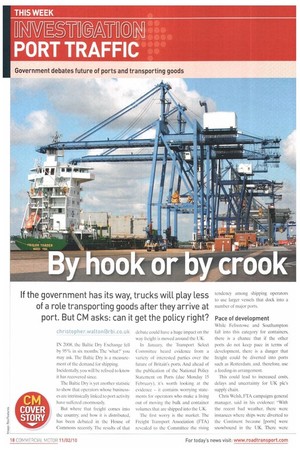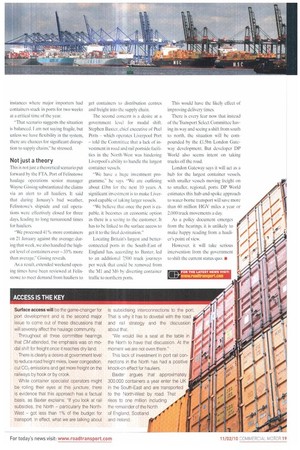If the government has its way, trucks will, play less
Page 18

Page 19

If you've noticed an error in this article please click here to report it so we can fix it.
of a role transporting goods after they arrive at port. But CM asks: can it get the policy right?
christopher.wattoniarbLco.uk
IN 2008. the Baltic Dry Exchange fell by 95% in six months. The 'what? you may ask. 'Ihe Baltic Dry is a measurement of the demand for shipping. Incidentally, you will be relived to know it has recovered since.
The Baltic Dry is yet another statistic to show that operators whose businesses are intrinsically linked to port activity have suffered enormously.
But where that freight conies into the country, and how it is distributed, has been debated in the House of g: Commons recently. The results of that E debate could have a huge impact on the way freight is moved around the UK.
In January, the Transport Select Committee heard evidence from a variety of interested parties over the future of Britain's ports, And ahead of the publication of the National Policy Statement on Ports (due Monday 15 February), it's worth looking at the evidence — it contains worrying statements for operators who make a living out of moving the bulk and container volumes that are shipped into the UK.
The first worry is the market. The Freight Transport Association (ETA) revealed to the Committee the rising tendency among shipping operators to use larger vessels that dock into a number of major ports,
Pace of development
While Felixstowe and Southampton fall into this category for containers, there is a chance that if the other ports do not keep pace in terms of development, there is a danger that freight could be diverted into ports such as Rotterdam, and, therefore, use a feeding-in arrangement.
This could lead to increased costs, delays and uncertainty for UK plc's supply chain.
Chris Welsh, FTA campaigns general manager. said in his evidence: "With the recent had weather, there were instances where ships were diverted to the Continent because [ports] were snowbound in the UK. There were instances where major importers had containers stuck in ports for two weeks at a critical time of the year.
"That scenario suggests the situation is balanced. I am not saying fragile, but unless we have flexibility in the system, there are chances for significant disruption to supply chains," he stressed.
Not just a theory
This is not just a theoretical scenario put forward by the ETA. Port of Felixstowe haulage operations senior manager Wayne Gissing substantiated the claims via an alert to all hauliers. It said that during January's bad weather, Felixstowe's shipside and rail operations were effectively closed for three days, leading to long turnaround times for hauliers.
"We processed 41% more containers on 21 January against the average; during that week, we also handled the highest level of containers ever — 33% more than average," Gissing reveals.
As a result, extended weekend opening times have been reviewed at Felixstowe to meet demand from hauliers to get containers to distribution centres and freight into the supply chain.
The second concern is a desire at a government level for modal shift. Stephen Baxter, chief executive of Peel Ports — which operates Liverpool Port — told the Committee that a lack of investment in road and rail portside facilities in the North-West was hindering Liverpool's ability to handle the largest container vessels.
"We have a huge investment programme." he says. "We are outlining about ilbn for the next 10 years. A significant investment is to make Liverpool capable of taking larger vessels.
"We believe that once the port is capable, it becomes an economic option as there is a saving to the customer. It has to be linked to the surface access to get it to the final destination."
Locating Britain's largest and betterconnected ports in the South-East of England has, according to Baxter, led to an additional 7.500 truck journeys per week that could be removed from the Ml and M6 by diverting container traffic to northern ports. This would have the likely effect of improving delivery times.
There is every fear now that instead of the Transport Select Committee having its way and seeing a shift from south to north, the situation will be compounded by the il.5bn London Gateway development. But developer DP World also seems intent on taking trucks off the road.
London Gateway says it will act as a hub for the largest container vessels, with smaller vessels moving freight on to smaller, regional, ports. DP World estimates this hub-and-spoke approach to water-borne transport will save more than 60 million HGV miles a year or 2,000 truck movements a day.
As a policy document emerges from the hearings, it is unlikely to make happy reading from a haulier's point of view.
However, it will take serious intervention from the government to shift the current status quo. E




































































































































